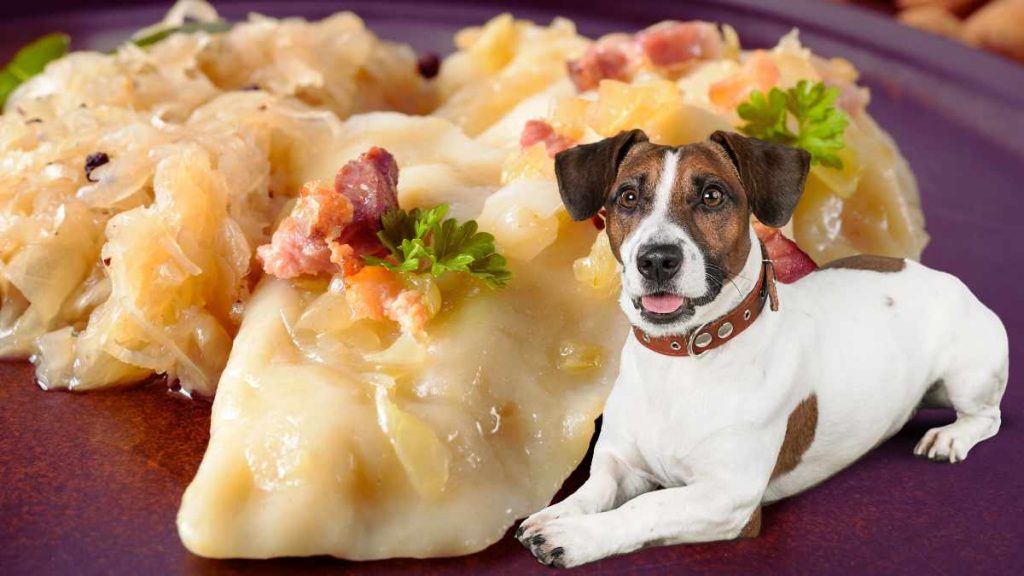As a dog food specialist, one common question I frequently encounter is, “Can dogs eat pierogies?” Pierogies are a popular dish in many cultures, consisting of dough pockets filled with various ingredients.
In this article, we will delve into the topic and address the nutritional concerns and potential risks associated with dogs consuming pierogies.
Table of Contents
What Are Pierogies?
Pierogies are a traditional dish originating from Eastern European countries such as Poland and Ukraine. These dumplings are made by wrapping unleavened dough around a filling, which can include potatoes, cheese, meat, or vegetables. They are typically boiled or fried and can be served with various toppings such as sour cream or butter.
Can Dogs Eat Pierogies?
While dogs are omnivores and can consume a range of foods, it’s important to consider their specific dietary requirements. Dogs thrive on a balanced diet primarily composed of high-quality proteins, healthy fats, and a moderate amount of carbohydrates. Although pierogies contain some ingredients that are safe for dogs, they are not an ideal choice for their overall nutrition.

Why Are Pierogies Bad for Dogs?
1. High Carbohydrate Content: Pierogies are predominantly carbohydrate-based, which can lead to excessive calorie intake and potential weight gain in dogs. This is especially concerning for dogs prone to obesity or those with underlying health conditions.
2. Potential Allergenic Ingredients: Pierogies often contain ingredients that may trigger allergies in dogs, such as wheat in the dough or dairy-based fillings. Allergies can manifest as gastrointestinal issues, skin problems, or respiratory difficulties.
3. Excessive Salt and Seasoning: Many pierogies are seasoned with salt and spices, which can be harmful to dogs in large quantities. Excess sodium intake can lead to dehydration, electrolyte imbalances, and even contribute to the development of cardiovascular issues.
4. Impact on Digestive System: Dogs have a different digestive system than humans, and foods that are rich in complex carbohydrates and fats can be challenging for them to process. Consuming pierogies may result in digestive upset, including diarrhea, vomiting, or constipation.
What Happens if a Dog Eats Pierogies?
If a dog consumes pierogies, several potential short-term and long-term effects may occur:
- Short-Term Effects: Dogs may experience gastrointestinal discomfort, including bloating, gas, and an upset stomach, shortly after consuming pierogies.
- Digestive Issues and Upset Stomach: The high carbohydrate content in pierogies can disrupt the balance of beneficial bacteria in a dog’s gut, leading to digestive issues and discomfort.
- Long-Term Health Risks: Regular consumption of pierogies can contribute to weight gain, nutrient imbalances, and potential complications such as pancreatitis or diabetes in dogs.
FAQ
1. Can dogs eat plain boiled pierogies without any seasoning?
While plain boiled pierogies may be a slightly better option compared to fried or seasoned ones, they still contain a high carbohydrate content and lack the essential nutrients required for a dog’s optimal health. It is best to avoid feeding pierogies to dogs altogether.
2. Are there any specific ingredients in pierogies that are toxic to dogs?
While most pierogie ingredients are not toxic to dogs, certain fillings like onions and garlic can be harmful. Onions, in particular, contain compounds that can damage a dog’s red blood cells, leading to anemia. It is important to avoid any pierogies that contain potentially toxic ingredients.
3. What are some alternative treats for dogs instead of pierogies?
There are numerous healthy and safe alternatives to pierogies that dogs can enjoy. Some options include small pieces of cooked lean meats like chicken or turkey, carrots, green beans, or dog-friendly fruits such as apple slices or blueberries. It is essential to choose treats that align with a dog’s dietary needs and consult with a veterinarian for specific recommendations.
4. How should I handle a situation where my dog accidentally consumes pierogies?
If your dog accidentally consumes pierogies, monitor them closely for any signs of digestive upset or discomfort. Offer plenty of fresh water and observe their behavior. If any concerning symptoms persist or worsen, it is advisable to seek veterinary guidance promptly.
5. Are there any dog-friendly variations of pierogies that can be safely prepared at home?
While traditional pierogies are not suitable for dogs, you can prepare homemade variations using dog-friendly ingredients. For example, you can make dog-friendly dumplings using whole wheat or grain-free flour, and fill them with lean meats, sweet potatoes, or carrots. However, it is crucial to ensure that all ingredients are safe and appropriate for your dog’s specific dietary needs.
Conclusion
In conclusion, while dogs can tolerate some human foods, pierogies are not an ideal choice for their diet. The high carbohydrate content, potential allergenic ingredients, excessive salt, and impact on the digestive system make pierogies an unsuitable food for dogs.
It is best to prioritize a balanced diet that meets a dog’s specific nutritional requirements. Remember to consult with a veterinarian for tailored dietary advice and suitable treat options to ensure the overall health and well-being of your furry companion.
You May Also Like:

